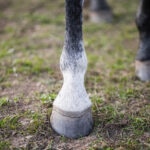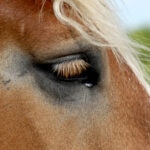Your Horse’s Teeth: Everything You Need to Know
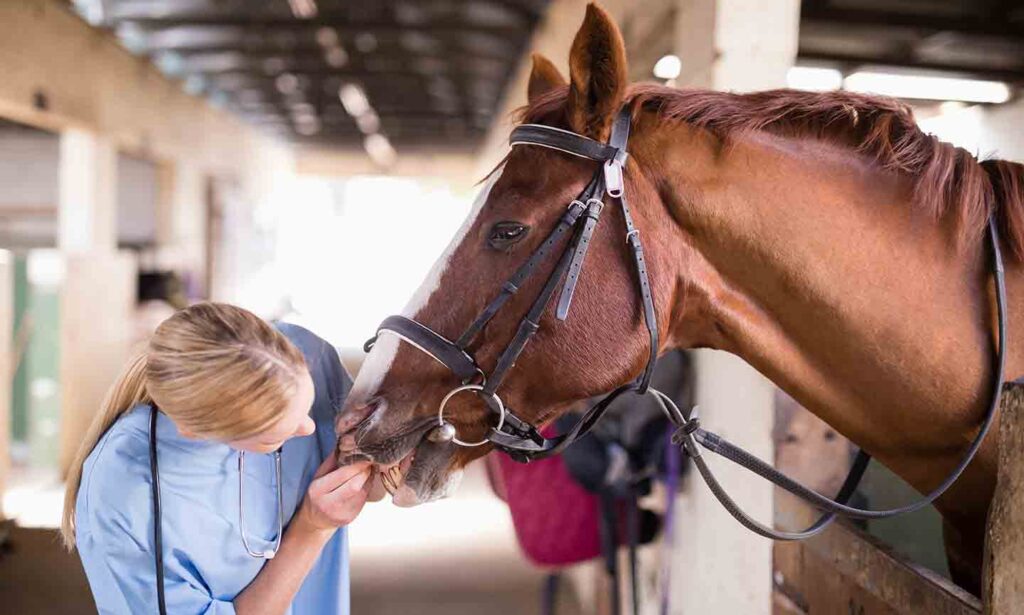
Photo by Wavebreakmedia/Getty
How Many Teeth Do Horses Have?
How many teeth horses have depends on what kind of teeth you’re talking about. Just like humans, horses grow and shed a full set of deciduous teeth, aka baby teeth or “milk teeth,” before their permanent (adult) teeth come in. Each has a different quantity:
- Deciduous teeth: 24
- Adult teeth: 36 to 44
The first deciduous incisors can either erupt in utero—before the foal is born—or appear within the first weeks of life. The rest of the foal’s 24 baby teeth—12 incisors and 12 premolars—come in over the first nine months of life. They start shedding and being replaced by permanent adult teeth at about 2½ years old, a process that takes about two-and-a-half years itself.
Most horses have their full set of adult teeth by age 5. A gelding (castrated male horse) or stallion (intact male horse) normally has 40-44 permanent teeth. A mare’s dentition ranges from 36 to 40 teeth.
What’s the four-tooth difference? Mares are less likely than their male counterparts to develop canine teeth. “The maximum number of teeth an adult horse can have is 44 if they develop all four canines plus two wolf teeth,” says Dr. Jessica Martin, DVM, cIVCA, associate veterinarian at Mountain Pointe Equine Veterinary Services in Long Valley, New Jersey. (We dig into the different types of horse teeth below.)
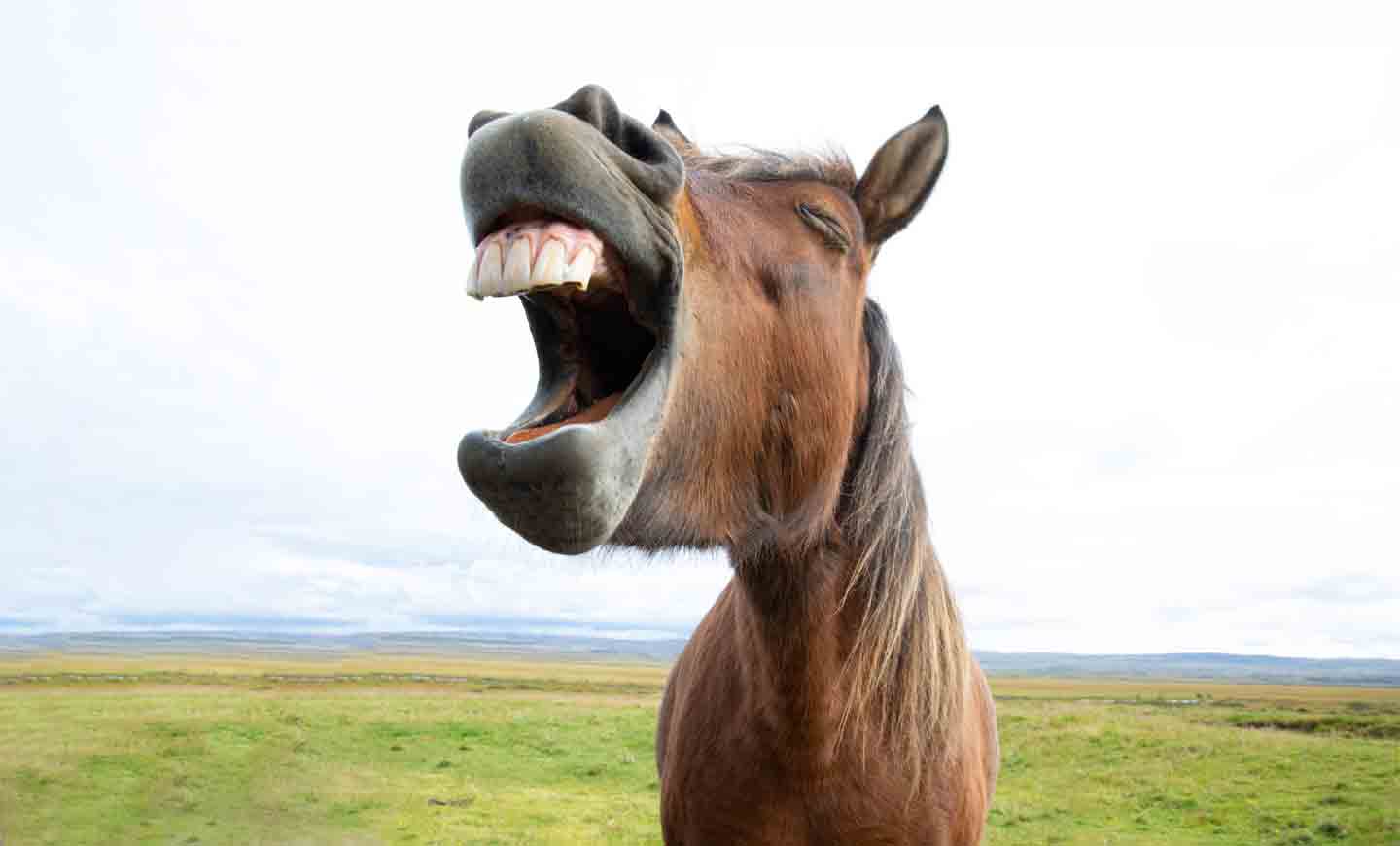
kevin morefield/Getty
Types of Horse Teeth
Adult horses can have five types of teeth: incisors, canines, wolf teeth, premolars and molars.
- Incisors: Twelve incisors line the front of a horse’s mouth—six on the upper jaw and six on the lower jaw. These long, smooth, flat-surfaced teeth rip grass out of the ground or hay out of the hay net.
- Canines: Also called fighting teeth, the sharp, fin-shaped canines are mainly used for fighting off rivals and predators.
- Wolf teeth: These are vestigial (remnants of) first premolars that have no function, Dr. Martin says. “There is often a concern for potential interference with the bit, therefore ridden horses’ wolf teeth are frequently extracted early in life.”
- Premolars: Horses have three premolars in each of the four quadrants of their mouth, totaling 12 premolars.
- Molars: Just like premolars, horses have three molars in each quadrant—12 in total. They are located at the very back of the mouth. With their wide rugged surfaces, both molars and premolars—also called cheek teeth—are used to crush and grind down food.
Horses are high-crowned hypsodonts, which means their teeth continuously grow from their gums to replace the tooth surface lost during repetitive chewing—something they do a lot of as a grazing animal. Hypsodonty is Mother Nature’s adaptation to keeping up with teeth that get worn down from grinding down coarse plants and grasses.
Did You Know? The part of your horse’s tooth that’s hidden underneath the gingival line (gums) is called the reserve crown.
How Horses Use Their Teeth
The main job of teeth, of course, is to intake and chew food before it is swallowed. But that’s not all! Here are four practical ways horses use their teeth:
- Eating: This one’s a no-brainer. As described above, different teeth in the horse’s mouth have different roles related to picking up and grinding food to prepare it for digestion.
- Grooming: Horses are social animals who bond through mutual grooming. They will use their incisors (sometimes rather forcefully!) across their herd mates’ coats and manes to groom and scratch them.
- Manipulating objects: Some horses have a reputation for being escape artists. With patience, observation and a touch of dexterity, horses and ponies can learn to use their mouths to open their stall doors and free themselves. With the help of both their lips and teeth, they can also manage to break into feed bins and other containers.
- Communication and defense: Canines and wolf teeth aside, horses’ teeth aren’t sharp and pointy like those of a predator—but horses can still effectively use their teeth to communicate aggression and defend themselves. If you’ve ever been bitten by a horse, you know it hurts!
Can You Tell a Horse’s Age By Their Teeth?
The short answer is yes. It’s possible to estimate a horse’s age by the appearance of their teeth. In fact, if you’ve got a horse without much information on their identity or history, peeking into their mouth is considered to be the most reliable way to guess their age bracket.
Aging affects your horse’s mouth in more ways than one, enabling you to pinpoint their age relatively precisely. Here are a few facts about horse teeth that help experts determine their age:
- Deciduous (baby) look different from permanent (adult) teeth. The deciduous teeth are wider than they are tall and have shallow roots. They sit upright in the gumline with little slope.
- Canine teeth appear in (usually male) horses during their fourth year of life.
- Young horses typically have a cup, aka a dent with a dark center, in the middle of their incisors’ grinding surfaces. The cups disappear progressively as the animal ages from 6 to 8-11 years old.
- The shape of the permanent teeth changes over time. A horse under 9 years of age will have a rectangular grinding surface; a horse from 9 to mid-teens will have a more round surface; and the grinding surface of horses older than mid-teens will look triangular.
- The angulation (slope) of the incisors increases with age. A young horse will have relatively upright teeth, while a senior one will have teeth that slope forward.
- Galvayne’s groove is a slight indent that appears near the gumline of the four corner incisors. If you can see any of Galvayne’s groove, it means the horse may be at least a decade old but younger than 30. This groove is barely visible in a 10-year-old. At 15 years, it extends halfway down the tooth; at 20 years, it spans the length of the entire tooth. At 25 years, the upper half of the groove is gone and visible only in the bottom half, and at 30 years, the groove is completely gone.
Common Horse Dental Problems
Just like people, horses can suffer from painful fractured teeth and stubborn dental infections. They can also have species-specific dental diseases. We’ve asked our experts to describe the most common equine dental problems:
Fractured or Infected Tooth
“When I find a fractured or infected tooth, I want to know what parts of the tooth are involved, the severity of the disease, and how this affects the horse’s ability to bite off and masticate food,” says Dr. Megan Hays, VMD, an associate equine veterinarian who practices dentistry at B.W. Furlong & Associates based in Oldwick, New Jersey.
“To learn more about the health of the tooth roots, periodontal ligament—which attaches the teeth to the jaws—and surrounding bone and sinuses within the skull, veterinarians can use radiography (X-rays) or computed tomography (CT),” Dr. Hays says. Fractured teeth often need to be extracted.
‘Expired’ or Missing Tooth
Horses’ teeth are worn down throughout their lives and replaced by the reserve tooth supply in the gums. The problem is that the supply lasts throughout the tooth’s life, not the horse’s. And nowadays, with improvements in veterinary medicine and general horse care, our equine companions are often outliving their teeth.
Horses continue to be born with a tooth supply designed for a 15- to 20-year life span rather than the 25- to 30-year lives that have become common. Beyond 15 years, age really takes a toll on your horse’s dentition, and they may very well run out of teeth. An expired tooth is one that has been worn down and lost its usefulness.
Hooks and Ramps
When a tooth expires, its absence creates an empty space along the gums, and the opposing tooth has nothing to stop it from growing into that space. This is how a hook (sharp tooth point) or ramp (overgrown cheek tooth) can develop.
These types of imbalances are called malocclusions. “It’s important to correct imbalances during routine dentistry to prevent restrictions in the chewing motion, oral pain and premature dental wearing,” Dr. Martin says. “Imbalances can also lead to feed being retained in the mouth, periodontal disease (gum disease), and even fractured teeth.” Hooks and ramps are addressed during dental floats by carefully and strategically floating down (aka filing) the affected teeth with a rasp.
Equine Odontoclastic Tooth Resorption and Hypercementosis (EOTRH)
Equine odontoclastic tooth resorption and hypercementosis is common in horses older than 15 years, and can affect the incisors and canine teeth. EOTRH is a progressive disease in which the bone and tissue surrounding the roots of a horse’s incisors are reabsorbed into the body. Not only is this painful and debilitating for the animal, but it also causes the teeth to become unstable, brittle and prone to fractures.
As prey animals who need to cover up pain and weakness to survive in the wild, horses tend to be quite stoic when it comes to dental pain. “Often, by the time visible signs of EOTRH appear, X-rays reveal advanced disease,” says Dr. Hays. “Early signs could include your horse no longer wanting to bite into an apple or a carrot, as these hard treats cause tooth pain.” Another sign: They may prefer hay that is easy to pick up off the ground versus hay they have to pull out from a hay net.
For these horses, Dr. Hays recommends working with your veterinarian to create a pain and feeding management plan adapted to their limitations. You want them to eat without their teeth hurting.
“Currently, the only treatment option for EOTRH is extracting the affected incisors and canines,” Dr. Hays says. Luckily, most toothless horses do really well with an adapted diet. Examples of appropriate feeds for “gummy” horses include soaked hay cubes and hay pellets, soaked beet pulp and soaked grain. Keep in mind that EOTRH-affected horses get to keep their premolars and molars, which do most of the grinding work in mastication.
Interestingly, research suggests a link between EOTRH and the most common endocrine disorder of geriatric horses, Pituitary Pars Intermedia Dysfunction (PPID or Cushing’s Disease). If your horse is showing signs of either condition, contact your veterinarian to schedule an examination.
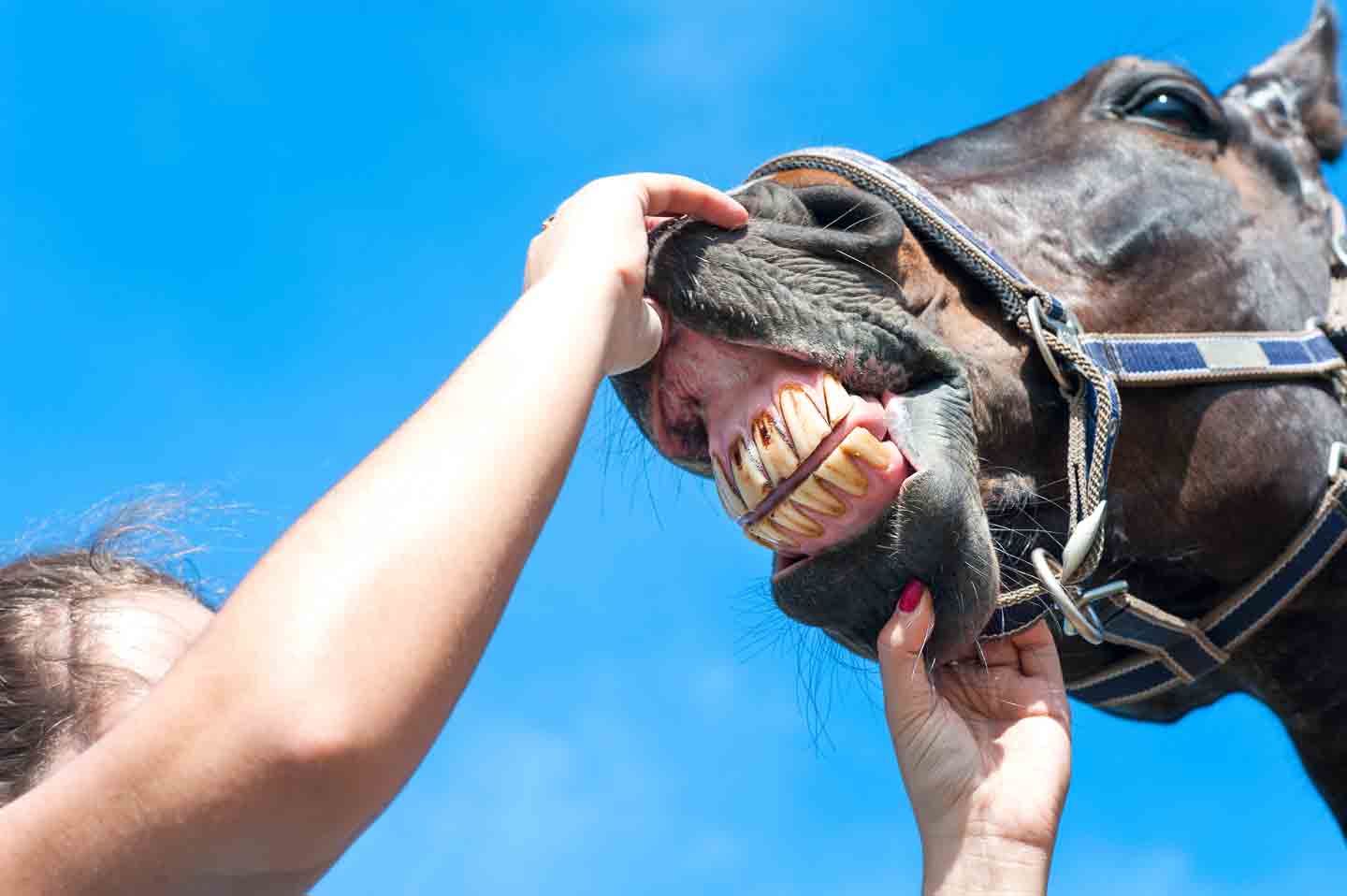
AnnaElizabethPhotography/Getty
Signs of Dental Problems in Horses
Signs of toothache in your horse can be subtle. Here’s what to look for:
- Quidding: A term for horses who can’t chew properly, and drop small balls of hay or grass when eating.
- Dropping grain: A horse who struggles to chew concentrates will drop mouthfuls of their ration while trying to eat.
- Refusing the bit/headshaking: When the bit puts pressure on tender teeth, the horse may shake their head or refuse to take it into their mouth altogether.
- A head tilt: This is another way for a horse to avoid using their sore teeth to eat or carry the bit.
- Losing weight: If a horse can’t properly chew and swallow feed, his calorie intake will drop. If this isn’t remedied quickly, they could lose a significant amount of weight.
- Nasal discharge and bad breath: Both are indicators of a potential tooth infection.
Routine Horse Dental Care
What exactly does a horse dental checkup look like? “Your equine veterinarian should perform a dental examination at a regular interval determined by the horse’s age; individual characteristics of their bite pattern; and the presence or absence of dental pathology,” says Dr. Martin.
A typical exam includes:
- Sedation to relax the horse
- Placement of a speculum to open the mouth
- A bright light and mirror to examine the surface of every tooth
Dental exams are recommended at least once per year for adult horses with no dental abnormalities. This frequency may differ depending on your horse’s individual needs.
“When chewing, the horse’s jaw moves in a figure-eight pattern, which differs from a human chewing pattern,” Dr. Martin says. “This motion naturally forms sharp edges, or sharp points, on the enamel surfaces of the premolars and molars. These require correction on a regular basis to maintain the horse’s comfort.” Dental floating is the term for filing the teeth to remove those sharp points.
Horses who have an abnormal bite pattern or dental pathology may have other imbalances that arise and require correction. This process is called dental equilibration.
FAQs about Horse Teeth
How often should a horse’s teeth be examined?
Veterinarians generally recommend having your horse’s teeth examined and floated every six to 12 months. The timeline for dental exams varies based on the horse’s age, oral conformation and any preexisting problems—such as malocclusions—that must be monitored and addressed over time.
How many teeth do horses have?
Foals have 24 baby teeth. Adult horses can have 36-44 permanent teeth.
What should a horse’s teeth look like?
Healthy teeth are made of vital pulp, dentin, cementum and enamel. They look wide and flat, and are laid in four even rows along your horse’s gums. Horses’ teeth are either white, off-white or yellow.
Taking good care of your horse’s pearly whites throughout their life can help them stay in good weight, healthy and pain-free. Keep up with regular dental care, and monitor for signs of dental pain. Ensuring your horse can chew their food properly also reduces their chances of developing health problems such as choke and colic.
Expert input provided by Dr. Jessica Martin, DVM, cIVCA, is an associate veterinarian at Mountain Pointe Equine Veterinary Services based in Long Valley, New Jersey; and Dr. Megan Hays, VMD, CVA, is an associate veterinarian at B.W. Furlong and Associates, an equine veterinary clinic based in Oldwick, New Jersey. Dr. Hays has a special interest in equine dentistry.
